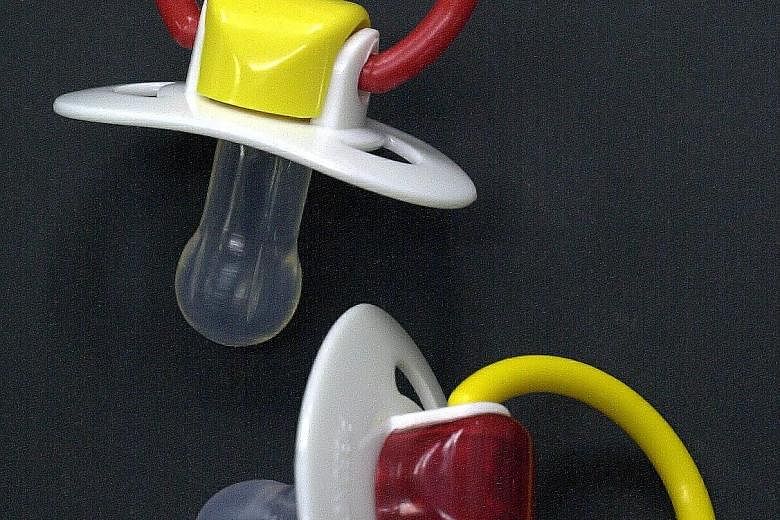Last month, retired football star David Beckham was criticised for giving his four-year-old daughter a pacifier. He defended himself, saying it comforts children best when they are not feeling well or have a fever.
Well, Beckham might know everything about football, but when it comes to raising babies, he faces a storm of differing opinions.
Here's what doctors say are the pros and cons of giving babies that pacifier to suck on.
YES, IT'S USEFUL
Pacifiers are useful when you are trying to calm or distract a crying baby, say, when he is about to undergo a painful immunisation shot, said Dr Mary Varughese, an associate consultant with the division of general ambulatory paediatrics and adolescent medicine at National University Hospital (NUH).
-
Tips on safe use
-
• Do not use the pacifier as the first line of comfort as there are other nurturing methods that can calm a fussy baby, such as cuddling, rocking and singing.
• Do not force the pacifier into the baby's mouth, or offer it repeatedly if it falls out while the baby is asleep. Use it mainly to soothe a distraught baby, or when putting a baby at risk of sudden infant death syndrome (SIDS) to bed. Some babies, like those who live with smokers or who are born early, might have a higher risk of SIDS.
• Always keep the pacifier clean, to avoid oral and gastrointestinal infections. Do not share pacifiers among siblings.
• Avoid sugar-coating the pacifier as it could result in tooth decay.
• Do not deviate from the manufacturer's recommended safety regulations.
Source: Dr Mary Varughese, associate consultant, division of general ambulatory paediatrics and adolescent medicine, National University Hospital
"Babies have a natural need to suck, and this sucking action can help to relax them and make them feel secure," she said.
"This self-soothing action also helps them fall asleep easily during naps and bedtime."
Some studies show that pacifier use is associated with a reduced risk of sudden infant death syndrome (SIDS) in infants.
Dr Varughese said: "The actual mechanism is not fully understood, but it could be that a baby with a pacifier in the mouth has an altered arousal threshold."
Still, opinion is currently divided over whether to routinely offer pacifiers to babies as a SIDS deterrent, she said.
BUT THERE ARE RISKS
Even though pacifiers can come in handy, they are not without risks.
Dr Varughese said they might pose a strangling hazard if attached to the baby with a cord or ribbon.
Also, some babies could have a latex allergy.
Pacifier use increases the risk of fungal infection (known as thrush) in the mouth, as well as recurrent middle-ear infections, Dr Varughese said. And in the early newborn period, pacifier use could adversely affect breastfeeding, she added. The baby might, for instance, reject the mother's breast.
"If parents are considering using a pacifier for their baby, it should be offered only after breastfeeding has been established - most likely after the first four to six weeks."
DON'T USE FOR LONG
In the long term, pacifier overuse could lead to dental problems, which might cause difficulties with, say, chewing or speech, according to experts.
The best time to start weaning a baby from the pacifier would be between the age of six months and a year, said Dr Varughese. During this period, she noted, the risk of SIDS is considerably reduced and middle-ear infections become more of a problem.
The longer you wait, the harder weaning could be as your child might grow to depend on the pacifier. If you cannot wean your child off the pacifier by the time he's a year old, do so before he turns two or three.
Dr Rashid Tahir from The Kids Dentist, a private clinic at Camden Medical Centre, said children should no longer be on a pacifier by the time they turn three.
"The use of a pacifier might influence the growth and development of the face and dentition - the jaws, tongue, facial muscles and alignment of teeth."
The paediatric dentist said pacifier-induced problems are not uncommon. They include:
- Increased protrusion of the upper and lower front teeth, giving the appearance of "buck teeth".
- An anterior open bite. Here, the upper and lower front teeth fail to meet when the back teeth make contact.
The child cannot chew efficiently with the front teeth because they do not make contact, said Dr Rashid.
According to the American Academy of Paediatric Dentistry, prolonged pacifier use could also affect growth of the jaws and bones that support the teeth.
Thumb or finger sucking, if done for prolonged periods, has a similar effect, said the academy.
However, a pacifier habit is often easier to break, it added.
"Dental effects are generally reversible and unlikely to cause any long-term problems if the habit is discontinued early," said the American Academy of Paediatrics.
"It is important to counsel families to help children break the habit before the permanent teeth erupt, preferably by age three."


